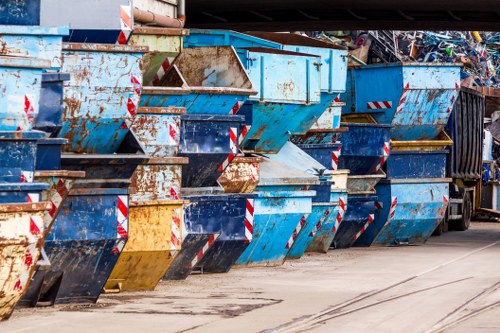Comprehensive Guide to Domestic Skip Hire in Canary Wharf
Understanding Domestic Skip Hire

Domestic skip hire is an essential service for homeowners in Canary Wharf looking to manage waste efficiently during renovations, clean-ups, or any large-scale domestic projects. Whether you're redecorating your kitchen, clearing out the garden, or undertaking a complete home makeover, hiring a skip can simplify the process by providing a designated space to dispose of unwanted materials.
Choosing the right skip size is crucial to ensure you have enough space without paying for more than you need. Common sizes range from 2-yard skips suitable for minor clean-ups to 10-yard skips designed for substantial home renovation projects. The flexibility in skip sizes allows residents to select an option that best fits their specific needs.
Moreover, hiring a skip promotes responsible waste management. Many skip hire companies in Canary Wharf are committed to eco-friendly disposal practices, ensuring that recyclable materials are properly sorted and processed, thereby minimizing the environmental impact.
Benefits of Domestic Skip Hire

**Convenience:** One of the primary advantages of domestic skip hire is the convenience it offers. Having a skip on-site means you can dispose of waste as you accumulate it, reducing the need for frequent trips to the local recycling center or landfill. This not only saves time but also ensures your workspace remains organized and clutter-free.
**Cost-Effective:** When compared to other waste disposal methods, hiring a skip is often more cost-effective, especially for large volumes of waste. It eliminates the need to purchase multiple trash bags or pay for multiple disposal trips, providing a centralized solution that can be more economical in the long run.
**Safety and Cleanliness:** Removing waste promptly reduces the risk of accidents and maintains a clean environment. This is particularly important during home renovations, where debris can create hazards if not managed properly. A skip provides a safe and contained space for waste disposal, contributing to a safer living environment.
Types of Waste Suitable for Skip Hire

When hiring a skip, it's important to be aware of the types of waste that can be legally and safely disposed of. Domestic skips typically accept:
- Household Waste: General household rubbish such as old furniture, broken appliances, and non-hazardous materials.
- Construction Waste: Materials from renovation projects, including bricks, concrete, metal, and wood.
- Garden Waste: Green waste like branches, grass clippings, and other organic materials.
However, certain items are prohibited, including hazardous materials like asbestos, chemicals, and batteries. It's essential to check with your skip hire provider for specific guidelines to avoid any compliance issues.
By understanding what can and cannot be disposed of, you ensure a smooth and efficient waste management process, keeping your project on track without any legal complications.
Choosing the Right Skip Hire Company

Selecting a reliable skip hire company in Canary Wharf is key to a hassle-free experience. Consider the following factors:
- Reputation: Look for companies with positive reviews and testimonials, indicating their reliability and quality of service.
- Flexible Hire Periods: Ensure the company offers flexible hire periods that accommodate your project timeline.
- Transparent Pricing: Choose providers that offer clear and upfront pricing without hidden fees, allowing you to budget effectively.
- Environmental Commitment: Opt for companies that prioritize environmentally friendly disposal practices, such as recycling and proper waste sorting.
By carefully evaluating these aspects, you can select a skip hire service that meets your needs and supports your waste management goals effectively.
How to Prepare for Skip Hire

Proper preparation is essential to maximize the benefits of skip hire. Follow these steps to ensure a smooth process:
- Assess Your Needs: Determine the type and volume of waste you expect to generate to choose the appropriate skip size.
- Secure a Location: Identify a suitable spot on your property where the skip can be placed without obstructing access or violating local regulations.
- Sorting Waste: Segregate recyclable materials from general waste to promote eco-friendly disposal and potentially reduce waste removal costs.
- Notify Neighbors: Inform your neighbors about the placement of the skip to maintain good relations and avoid any inconvenience.
By following these preparatory steps, you ensure that the skip hire process is efficient, organized, and aligned with your project requirements.
Safety Tips for Using a Domestic Skip
Safety should always be a priority when using a domestic skip. Here are some essential tips to keep in mind:
- Weight Limits: Adhere to the skip’s weight capacity to prevent overloading, which can lead to structural instability and potential accidents.
- Proper Loading: Distribute waste evenly within the skip to maintain balance and ensure safe handling during transportation.
- Hazardous Materials: Avoid disposing of hazardous items in the skip to minimize health risks and environmental harm.
- Access Routes: Ensure that the area around the skip is clear to allow easy access for waste disposal and skip removal without obstructions.
Implementing these safety measures helps maintain a secure environment while using a skip, safeguarding both your property and the people around it.
Contact us today to learn more about our domestic skip hire services in Canary Wharf and make your next home project a success.